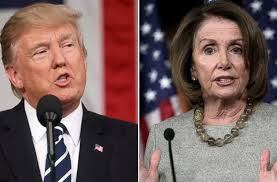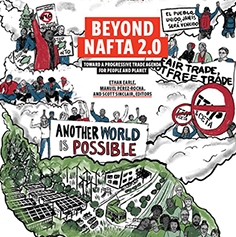Published by Labor Fightback Network
In a statement issued shortly after the June 23 referendum in Britain, in which the majority of the voters chose to leave the European Union, Bernie Sanders wrote an Op-Ed article in The New York Times, titled, “Democrats Need to Wake Up.” In it Sanders noted that,
“In the last 15 years, nearly 60,000 factories in this country have closed, and more than 4.8 million well-paid manufacturing jobs have disappeared. Much of this is related to disastrous trade agreements that encourage corporations to move to low-wage countries.
“Despite major increases in productivity, the median male worker in America today is making $726 dollars less than he did in 1973, while the median female worker is making $1,154 less than she did in 2007, after adjusting for inflation.
“Nearly 47 million Americans live in poverty. An estimated 28 million have no health insurance, while many others are underinsured. Millions of people are struggling with outrageous levels of student debt. For perhaps the first time in modern history, our younger generation will probably have a lower standard of living than their parents. Frighteningly, millions of poorly educated Americans will have a shorter life span than the previous generation as they succumb to despair, drugs and alcohol.”
Sanders’ assessment of the devastating effects of “free trade” is spot-on. Working people at home and across the globe are sick and tired of “free trade” agreements that are driving them into poverty, smashing and/or subverting the independence of their trade unions, and rolling back their collective rights — while only benefiting the speculators and corporate robber-barons.
Democrats: The Party of “Free Trade”
There can be no question that the anger that exists in Britain as a result of the destruction of jobs and working class communities by the EU and the corporate globalizers is just as strong, or stronger, in the United States against the devastating effects of NAFTA — and against the threats posed by the Trans-Pacific Partnership agreement (TPP).
But herein lies a major problem. Hillary Clinton, the candidate that the U.S. labor movement will be supporting in November, was one of the main architects of TPP in her days as Secretary of State (when she called the TPP the “Gold Standard” of trade agreements). The Democrats are the ones who brought us NAFTA, CAFTA, the U.S.-Korea Free Trade Agreement, the U.S.-Colombia TPA, the U.S.-Peru TPA, and more.
Already, the Democratic National Committee (DNC) has rejected including opposition to TPP in the Democratic Party platform (just as it has rejected including Single-payer healthcare and other vital questions facing working people).
Clinton’s nomination of Tim Kaine as her vice-presidential running mate is another signal that the Democratic Party is unabashedly on the side of “free trade.” Kaine voted to “fast track” TPP (not to mention his support for “right-to-work” laws in his home state of Virginia and his call for restricting abortion rights even further).
It is very possible that the Democratic Party leadership will make some minor, mostly window-dressing changes to the DNC position paper on TPP. Clinton and other top Democrats have said that they now oppose TPP “as it stands” – indicating they would be in favor of some changes.
But it cannot be excluded that the Democratic Party leadership will simply uphold the DNC decision on TPP — and plow ahead. Making even cosmetic changes to TPP might not be so easy, as the dozens of countries that have already passed TPP would have to revisit the issue.
Need for Labor Movement to Take the Lead
Many political leaders — including Bernie Sanders — are warning that President Obama may push for a vote to approve TPP during the “lame-duck” session (after the November elections and before the new president takes office in January 2017). In this way, Hillary Clinton does not have to take the heat — and Obama can make TPP passage part of his legacy, which is one of his stated goals.
Given the very real possibility that TPP could be brought to a vote during the lame-duck session, which is only a few months from now, isn’t it imperative that the labor movement take the lead in organizing mass, united-front actions to Stop TPP, in alliance with labor’s community allies? [See Model Resolution below.]
Top labor officials, who are tied at the hip to the Democratic Party, will tell us that this is neither possible nor desirable, that our Number 1 priority today must be to Stop Trump in November and get Hillary Clinton elected. But isn’t Clinton the very personification of the global “free trade” agenda? Shouldn’t labor rise to the occasion in the face of such an imminent threat to all working people — and to democracy itself? And couldn’t the Labor for Bernie organizers and members champion this struggle in the labor movement?
Having said this, mobilizing hundreds of thousands of people in the streets in massive united-front actions to stop the TPP is only the first step.
It will take more than united mass actions to put a halt to the corporate juggernaut. As former (and now-departed) OCAW leader Tony Mazzocchi was fond of saying, “The bosses have two parties, workers need one of our own.”
With the choice of Trump vs. Hillary Clinton in November, never has Mazzocchi’s saying rung so true: Working people today need a mass workers’ party, a Labor Party based on the unions and on the communities of the oppressed.
How do we get there from here?
A recent posting by the Labor Fightback Network offers a necessary – and viable – perspective in this regard. It states, in part:
“While labor has been waging a vigorous campaign against the TPP, it remains preoccupied with electing Democrats, as if that is the way forward. But even here, it is stymied, as we can see by the Democratic Party’s Platform Committee’s failure to take a stand against the TPP. So why should labor continue to support such a party or even be part of it?
“We again urge transition steps to forming a party of our own. As we wrote previously:
“‘It is high time for labor to challenge the monopoly that Big Business exercises in the electoral arena. To be sure, this requires the spearheading of a coalition with its community allies. Labor could be a magnetic force in helping to unite tens of millions in support of a program that reflects the needs of workers, communities of color, youth, environmentalists, and other progressive forces.
“‘For the above reasons, the Labor Fightback Network urges the formation of independent labor-community coalitions in cities and states around the country based on a program collectively decided. Such coalitions, functioning democratically, could serve as building blocks for a national party, which is indispensable, and in the meanwhile run its own candidates to challenge the status quo. The alternative is despair, dissolution, and irrelevance.’”
The time is now for labor to take steps in this direction.
* * * * *
MODEL RESOLUTION
U.S. Labor Must Lead Fight to Stop the TPP!
Whereas, in the last 15 years, nearly 60,000 factories in this country have closed, and more than 4.8 million well-paid manufacturing jobs have disappeared largely as a result of disastrous “free trade” agreements (such as NAFTA, CAFTA, the U.S.-Korea Free Trade Agreement, etc.) that encourage corporations to move to low-wage countries;
Whereas, despite major increases in productivity, the median male worker in America today is making $726 dollars less than he did in 1973, while the median female worker is making $1,154 less than she did in 2007, after adjusting for inflation.
“Whereas growing numbers of working people are sick and tired of “free trade” agreements that are driving them into poverty, smashing and/or subverting the independence of their trade unions, and rolling back their collective rights — while only benefiting the speculators and corporate robber-barons.
“Whereas, the labor movement has taken a firm stand against the Trans-Pacific Partnership agreement (TPP), which, if passed, would further devastate the working and living conditions of millions of working families across the nation;
“Whereas, the Democratic National Committee (DNC) has rejected including opposition to TPP in the Democratic Party platform, while Hillary Clinton’s vice presidential nominee, Tim Kaine, voted to “fast track” the TPP, and Clinton herself has stated that she opposes TPP “as it stands” — meaning that she could support TPP if changes were made (most likely minor, mainly window-dressing changes); and
Whereas, Bernie Sanders warned at the Democratic National Convention that President Obama may push for a vote to approve TPP during the “lame-duck” session of the Congress, as the president has insisted he would like TPP passage to be part of his legacy.
Therefore be it resolved, that the ___________ [name of union] calls on the leaders of the AFL-CIO and Change to Win to take the lead in organizing mass, united-front actions in the streets, in alliance with labor’s community allies, in the coming weeks and months to prevent TPP from being adopted during the lame-duck session of Congress or any time thereafter.
**********************************************************************************************

